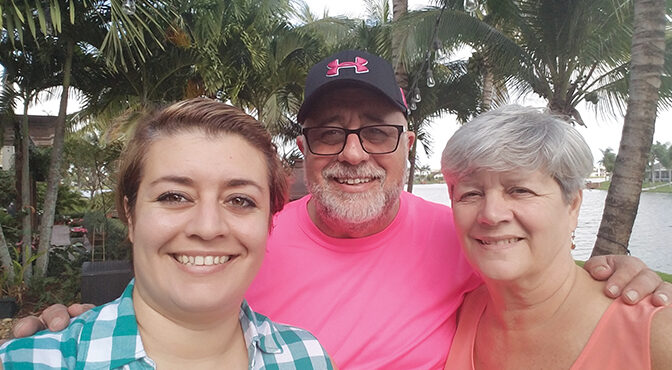Survivor Jessica Duemig Warns That Breast Cancer Is A Concern For Women Of All Ages Early Detection
Jessica Duemig was 32 years old when she discovered a lump that turned out to be breast cancer — eight years before she was due for her first mammogram. Since then, she has written a book about her experience and become an advocate for early detection of this dreaded disease.
Early one morning, Duemig was getting ready for work as an account services representative for an international advertising agency. Career-driven, she worked as a sports marketing expert rising the ranks in a high-pressure industry, when she noticed a sharp pain on her left side, right where the ribcage starts to curve.
“I thought it was a pimple that didn’t have a head on it, and I didn’t think any more about it, explained Duemig, a Wellington High School graduate.
The pimple-like spot went away, but it returned with a vengeance two months later. “One morning, it was back. It hurt, and it was four times the size it had been… The size of a big gumball,” recalled Duemig, who didn’t yet know that her career, in fact, her whole life, had suddenly hit a pink wall.
The bad news: stage two triple negative metaplastic breast cancer — and Duemig said that she can’t stress this enough, it was eight years before she thought she even had to begin worrying about breast cancer.
“They usually start mammograms on women when they are 40,” said Duemig, who found the lump during a time period when she was being recruited for a new, even greater job on the client side of the business. “The doctor told me I’d have to put my life on hold. I said, ‘This isn’t going to work for me.’ My treatment plan followed my own rules. I started my new job the first day after my third chemo treatment. From diagnosis to done, it was seven months. I was single, no kids, materialistic, self-driven, and completely out of the blue, I was going to have a double mastectomy and chemotherapy.”
So, Duemig wrote her book, Warrior: Challenge Accepted.
“Warrior is the book I wished I had the day I got the diagnosis. It would have made a great gift,” she said. “Who was I going to talk to who understood me and my point in life?”
Breast cancer books on the market are not usually geared toward career-focused women.
“There seem to be two types of cancer books,” said Duemig, describing the technical, medically oriented books written by healthcare professionals and, “The fluffy, girlie, kid-glove, softer approach.”
Her book is different.
“Warrior is the story of the battle I went through,” Duemig said. “The cover matches the content. It’s raw and uncensored. It is for survivors and their supporters.”
She explained that the book is for women who have or want to have the “I got this” attitude.
“I went to the doctor the week between Christmas and New Year’s,” Duemig said. “I wanted to get in before my insurance reset at the beginning of the year.”
The doctor confirmed that there was a lump and immediately scheduled her for a mammogram and an ultrasound.
“I’ve heard people say, ‘But mammograms are so uncomfortable,” Duemig said. “I will tell you what’s uncomfortable — surgery, chemo, cancer. That’s really uncomfortable.”
The biopsy was also very unpleasant. “It was the most painful thing that I’ve ever done,” she said.
The lump was growing fast and getting more solid, and if she had waited, it might have been too late.
Duemig was officially diagnosed Feb. 1, 2017. Immediately, she was scheduled for her operation, fertility preservation and four months of chemotherapy. “On Feb. 28, 2020, I was officially cured,” Duemig said. “Now, I am that voice in support groups I wish I had when it happened to me.”
At first, she didn’t think she needed a support group. “They asked me probably at least 15 times if I wanted to join a support group, and I’m very fortunate to have a tight-knit family and a huge group of friends, but none of them have ever been around cancer, and certainly not in someone so young,” Duemig said. “I didn’t know at first that I needed a support group. But just having someone you can call who will sit there on the other end of the phone and listen to you helps. There’s nothing they can say to make it better. There’s no advice that’s going to make it OK. And I asked a lot of questions of the doctors directly.”
In her book, Duemig talks about the chemotherapy and the trepidation that patients have.
“Their mindset can help them with their reaction,” she said. “Chemo is very real, and attitude is everything. You have to go into cancer treatment knowing you’re going to beat it, or at least having convinced yourself that you are, because the minute you start to doubt yourself, the minute you think it’s a death sentence, it very well could be.”
The way the disease affects people is different.
“I was a warrior,” she said. “I gained weight during chemotherapy. That’s unusual, but it shows that attitude is everything. Warrior definitely takes the fear of the unknown off the table. It puts into words what the patient can’t in the heat of the moment when they are literally fighting for their lives.”
In the book, Duemig shares her story, but does not suggest it fits everyone’s situation.
“The book is my experience,” she said. “It is not a recipe book. It is the practical preparation I took and should have taken if someone had told me. It is a guidebook of what to expect, to empower people.”
Warrior: Challenge Accepted by Jessica Duemig is available in hardcover, paperback and audio form on Amazon. Visit www.warriorguidebook.com or www.facebook.com/warriorguidebook to learn more.
